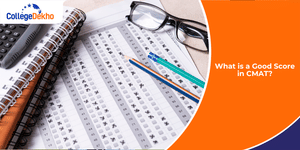KIIT School of Management, Bhubaneswar News

What is a Good Score in CMAT 2026?
If you’ve been wondering what is a good score in CMAT 2026 exam, the general benchmarks are already quite clear. A score in the bracket of 295 and 345+ is considered good enough to secure a 90 to 99.99 percentile, which is widely regarded as an excellent performance. Those seeking to join institutes like JBIMS, SIMSREE, SIES, BIMTECH, JAGSoM, etc, must note that the target score is typically higher, typically between 290 and 360 marks, which often aligns with a 98 to 99.99+ percentile.
The CMAT 2026 exam was conducted on January 25, 2026, and was of an easy-to-moderate level. Knowing the CMAT cutoff trends helps them to prepare accordingly and know a realistic range to gain admission to their desired college. Also, it helps them understand how different score ranges translate into percentile brackets and which colleges fall within each band.
In this article, let's explore what counts as a competitive score for CMAT 2026.

Top Colleges Accepting AIMA UGAT 2026 Score for BBA, IMBA, BCA, BHMCT, BCom Admissions
Top colleges accepting AIMA UGAT 2026 scores for BBA, IMBA, BCA, BHMCT, and BCom admissions include GITAM Institute of Management, ITM University, Jagannath Institute of Management Sciences, and Ahmedabad University. AIMA (All India Management Association) conducts the UGAT (Under Graduate Aptitude Test) for these programs. AIMA UGAT is usually administered offline, however, in 2026, it was conducted in the Internet-Based Test (IBT) mode. Over 60 colleges in India consider UGAT scores for admission, making them some of the top institutions in the country. The AIMA UGAT 2026 exam is scheduled for June 2026. Candidates can indicate up to five participating institutes, and AIMA will share their UGAT scores with these institutes. AIMA also provides candidates with a UGAT scorecard for admission purposes.
Also Read: Documents Required to Fill AIMA UGAT 2026 Application Form

Is CAT Exam Compulsory for MBA?
Many aspiring MBA students often wonder about an important question: Is the CAT exam compulsory for MBA? The simple answer is NO! Taking the CAT exam is not mandatory for enrolling in MBA programmes in India or abroad. However, it is important to note that the CAT is the most widely accepted and recognised entrance exam for MBA programs in India. You can certainly look at other alternatives to CAT like MAT, XAT, SNAP, or other entrance exams. That said, since the IIMs hold a coveted position, being considered the best for an MBA education within the country, it is given a good weightage.
KSOM Faculty Chairs a Session of the International Conference on Changing Paradigms
Dr. Bishwajit Das, KSOM faculty chaired a session of the International Conference on Changing Paradigms ( ICCBM- 2022) of MDI Murshidabad with Prof. Amit Sareen Dean IMT Ghaziabad on the topic 'Sustainable Business Strategies During Pandemic Times’ . MDI Dean was also present for the same.
KSOM Organises Knowledge Dialogue Session on Mental Health
KSOM organised a webinar on Jan 15 from 5-6 pm on the topic 'Mental Health: Conquering the World with Wellness'. Writer, Wellness Coach and Yoga Instructor, Grace Grossman was the guest speaker at the event. She talked about the physical and cognitive aspects of how to deal with mental stress. MBA students Anisha Mohanty and Barenya Kar were the ones anchoring the webinar. Ayushi Biswas, MBA student, and coordinator of Book Hive gave the vote of thanks.
KSOM Faculty Receives National Education Award
KSOM Professor, Dr Shikta Singh received the National Education Award - APJ Abdul Kalam Teacher's Excellence Award, AICTE, GOI in the presence of the Education and Law and Justice Minister Shri Subhash Sarkar and Shri Singh Baghel in the Constitutional Club of India, New Delhi. She spoke about the Founder, Achyuta Samanata, and highlighted his contribution to the development of KIIT and KISS and the state. She also stated that over 27,000 tribal students are being given free education, shelter, and food at the Kalinga Institute of Social Sciences.
KSOM Organises Online FDP on Leadership
KSOM has organized an Online Faculty Development Programme (FDP) on 'LEADERSHIP GEN NEXT: EXERTING INFLUENCE NOT AUTHORITY' from January 13 to 17, 2021. This was an ATAL, AICTE, GOI Approved project bagged by Prof. Shikta Singh, Associate Professor, KSOM, KIIT University. The programme witnessed more than 200 participants.
KSOM Organizes Webinar on Disruptions & Digital Transformation
KSOM organized a webinar on 'Disruptions & Digital Transformation' on January 16, 2021, as a part of its Knowledge Dialogue series. The esteemed speaker was Siddharth Chhottray. He is presently Apprentice Leader II, Project Manager, Mu Sigma.
KSOM Bags the Best B School of Odisha Award by TIMES Business Awards
KSOM received the Best B-School of Odisha from Times Business Awards 2020. It is the annual flagship property of the Times of India to felicitate achievers of the business fraternity across various categories. Director of KSOM, Dr. Saroj Mahapatra received the award from the popular entrepreneur, Mr. Subroto Bagchi.
KSOM-ICSSR sponsored National Seminar on Inclusiveness of the Differently Abled
A 2-Day National Seminar on Challenges & Opportunities for Differently Abled People in India and their inclusiveness in the mainstream of society has been organised at KIIT SOM in collaboration with ICSSR.
Mrs Shallu Jindal was the Chief Guest of the seminar. She is the Co-Chairperson, JSPL Foundation, a famous Kuchipudi dance and a successful entrepreneur.
The welcome address was delivered by Prof. SK Mahapatra, Director, KSOM followed by context setting of the seminar by Prof. S.N Mishra, Dean, KSOM. The Inaugural Address was given by Prof. Hrushikesha Mohanty. Vice-Chancellor, KIIT DU. Dr. Sruti Mohapatra, Founder, Swabhiman delivered the keynote address.
KSOM Discussion on Budget 2020
On 31st January 2020, the MBA masterminds of KSOM had a detailed discussion on Budget 2020 under the able guidance of Professor Shikha Singh. They discussed at length about the expectations of the common man with regards to one objective of improving the GDP growth with respect to all the five major sectors of the Indian economy and aligning that with the 17 SDGs. These students of KSOM carried out the discussion in a brilliant form with respect to the provision, progress, and expectations from the Budget 2020 revolving around agriculture and the rural sector, industry, finance sector, healthcare, education, and infrastructure.
Research Paper by Student Published in Journal
Aditi Mishra, a student of MBA II at KSOM, has published a research paper with the title "Review of Flea Market in India and Evidence from Bhubaneswar". The paper was released in the journal of 'Regional School of Management' named 'SIDHAANT.' Aditi expressed her gratitude to her mentor and co-author, Professor Braja Kar, for his unstinting support and guidance.
KSOM Professor Abhishek Kumar and Ipseeta Satpathy Publish Book
Professor (Dr.) Abhishek Kumar and Professor (Dr.) Ipseeta Satpathy of KSOM jointly worked upon a book and published it, the title of which is 'Economic Growth in India (Global and Domestic Challenges)'. The book was released on 27th December 2019, on the occasion of the 102nd Annual Conference of the Indian Economic Association (IEA) which was held at Pandit Ravishankar Shukla University, Raipur. The release of the book was facilitated by Professor S. Mahendra Dev, Vice-Chancellor, IGIDR and Vice Chairman, International Food Policy Research Institute, Washington, D. C. and Professor Kaushik Basu, President International Economic Association, Chief Economist World Bank and Professor of Economics and Carl Marks, Professor of International Studies, Cornell University.
Students of KSOM Bag Top Honours at 6th ZENITH, a Reward & Recognition Programme conducted by National HRD Network (NHRDN)
The students of KIIT School of Management bagged top honours at the 6th ZENITH. It is a reward and recognition programme that is conducted by the National HRD Network (NHRDN). KSOM students won accolades at the Bhubaneswar Chapter of ZENITH, held at Infosys on 7th February 2020.
The National HRD Network, abbreviated as NHRDN, is a global centre focused at grooming leaders. It is also the national apex body of professionals who are committed to promoting the People Development movement in the country as well as giving a boost to the capability of human resource professionals to compete globally, thereby creating value for society. National HRD Network lays strong emphasis on the development of human resources through education, research, training, and experience sharing.
KIIT School of Management Organised Konfidant- Corporate Mentorship Programme
KIIT School of Management (KSOM) conducted Konfidant- Corporate Mentorship Program on November 16th, 2019 at Campus-7. The aim of the Konfidant program was to provide MBA students with mentorship from corporate leaders and industry experts during their stay at KIIT Deeembed to be University.
Through the Corporate Mentorship Program, students will get a golden opportunity to interact with industry experts. The industry experts will take over the role of a mentor and a small group of 10-23 students will be assigned to them as mentees. Mentors will monitor the progress of the mentees and will also supervise their work.
The mentor-mentee relationship is planned to be long-term and the mentees can continue to engage with their mentors over emails or telephone depending upon their requirements.
This is a great initiative on behalf of KIIT School of Management (KSOM) as it will help the students gain professional knowledge and enhance their skills.
KSOM Organised 10th National Conclave on the Theme Getting to $5 Trillion: Navigating the Financial Landscape
KSOM Organised 10th National Finance Conclave on October 19th, 2019 and the theme of the conclave was - “Getting to $5 Trillion: Navigating the Financial Landscape”.
KSOM Dean, Prof. S.N. Mishra delivered the addressed during the conclave and said that the topic is extremely applicable to the current economic scenario. According to him, this is a very interesting time for the Indian economy as there is a continuation of the commitment of a free market.
Prof. Hrushikesha Mohanty, Vice-Chancellor, KIIT DU welcomed all the guests and said that the discussions will help them gain insights into achieving the $5 trillion target.
Prof. Sudipto Mundle, Distinguished Fellow, NCAER was the main speaker of the conclave and shared his view that the current budget should be reviewed again. The recent revision of the corporate tax rate will help in achieving a strong positive impact on growth in the medium to long term. The conclave had two-panel discussions, followed by Finatix.
Related News

UoH opens MBA Admission 2026: Steps to Apply, Eligibility Criteria
UoH MBA Admission 2026: The University of Hyderabad (UoH) has started the online registration process for MBA Admission 2026, seeking applications for its two-year MBA course (2026-28 batch). Candidates interested in pursuing a management course can now apply through the official admission portal of the university. The total number of seats available for the course is 75. Candidates interested in the course are required to apply online on or before January 31, 2026. The admissions will be conducted based on the eligibility criteria and performance in the selection process, as announced by the university.

List of MBA Colleges Accepting 60-70 Percentile in CMAT 2026
The list of MBA colleges accepting 60-70 percentile in CMAT 2026 highlights recognised names such as DY Patil Mumbai, Universal Business School, Institute of Management Christ University, Jagannath International Management School Delhi, IMS Ghaziabad, etc. These institutes usually grant admission to the management programmes based on a CMAT percentile range between 60 and 70 and are known for providing quality education through the latest academic frameworks and industry-oriented exposure.
A CMAT score ranging from 141 to 170 out of 400 generally corresponds to the 60–70 percentile bracket. Although these colleges may not be the first choice for those scoring above 90 or 95 percentile, aspirants securing a percentile in the said band still have access to several respectable MBA options. Majority of these colleges provide career-focused programmes, practical learning opportunities, regular industry exposure, and well-maintained campus facilities.

List of MBA Colleges Accepting 80-90 Percentile in CMAT 2026
The list of MBA colleges accepting 80-90 percentile in CMAT 2026 features names such as Welingkar, Great Lakes Institute of Management, St. Xavier’s University, and IMT Nagpur. These institutes are known for industry-relevant MBA programmes, having experienced faculty, reliable campus facilities, and strong placement assistance. Although they may not be among the options available in the 99+ percentile category, they remain strong options for aspirants seeking a recognised and career-focused management degree.
The CMAT 2026 exam was conducted by NTA on January 25, 2026, across more than 100 CMAT exam centres nationwide. CMAT 2026 results are likely to be launched in the second/ third week of February 2026. Having an idea of this 80-90 percentile-based college list is especially useful for shortlisting options for CMAT aspirants.

BHU MBA-IB Registration 2026: Apply Online, Fees, Important Instructions
BHU MBA-IB 2026 Registration is ongoing, and the last date to submit your applications is January 31, 2026. Banaras Hindu University, through its Management Institute, offers an MBA in International Business. It is a two-year full-time program for executives who want to build a comprehensive global management perspective. This program focuses on different specializations such as Global Business Operations, Marketing, Finance, Human Resource Management, Information Technology, and Operations Management. There are currently 59 seats available for the MBA-IB program for the 2026 batch.

What is a Good Score in CMAT 2026?
If you’ve been wondering what is a good score in CMAT 2026 exam, the general benchmarks are already quite clear. A score in the bracket of 295 and 345+ is considered good enough to secure a 90 to 99.99 percentile, which is widely regarded as an excellent performance. Those seeking to join institutes like JBIMS, SIMSREE, SIES, BIMTECH, JAGSoM, etc, must note that the target score is typically higher, typically between 290 and 360 marks, which often aligns with a 98 to 99.99+ percentile.
The CMAT 2026 exam was conducted on January 25, 2026, and was of an easy-to-moderate level. Knowing the CMAT cutoff trends helps them to prepare accordingly and know a realistic range to gain admission to their desired college. Also, it helps them understand how different score ranges translate into percentile brackets and which colleges fall within each band.
In this article, let's explore what counts as a competitive score for CMAT 2026.
Top Courses at KIIT School of Management, Bhubaneswar
Related Questions
Admission Updates for 2026
Institute of Management & Information Science
Bhubaneswar (Odisha)
Astha School of Management
Bhubaneswar (Odisha)
CGC Landran
Mohali (Punjab)
Rai University
Ahmedabad (Gujarat)
Indus University
Ahmedabad (Gujarat)







